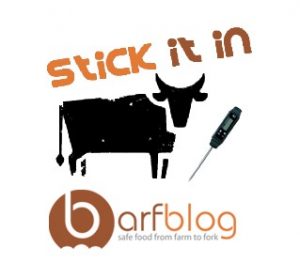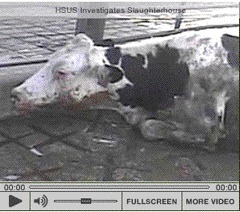On March 20, 1996, British Health Secretary Stephen Dorrell rose in the House to inform colleagues that scientists had discovered a new variant of Creutzfeldt-Jakob disease (CJD) in 10 victims, and that they could not rule out a link with consumption .jpeg) of beef from cattle with bovine spongiform encephalopathy (BSE), also known as mad cow disease.
of beef from cattle with bovine spongiform encephalopathy (BSE), also known as mad cow disease.
Overnight, the British beef market collapsed and politicians quickly learned how to enunciate bovine spongiform encephalopathy and Creutzfeldt-Jakob disease. Within days, the European Union banned exports of British beef; consumption of beef fell throughout Europe; and the tell-tale triumvirate of uncertain science, risk and politics was played out—and continues—in media headlines. Beef consumption across the European Union (EU) dropped 11 per cent in 1996, and the BSE crisis cost the EU US$2.8 billion in subsidies alone to the beef industry in the first year.
Yet the March 20, 1996 announcement, rather than the beginning of the on-going BSE crisis, as it is now commonly called, was instead the culmination of 10 years of bureaucratic mismanagement, political bravado, and a gross underestimation of the public’s capacity to deal with risk.
In response to BSE and several other food poisoning outbreaks, the Food Standards Agency was created in 2000. I may have some of the details wrong because I’m going for speed at the moment and relying on wiki, but one of the key .jpg) philosophical underpinnings of the new agency was that farming, food processing and food safety maybe shouldn’t be concentrated in one department. You hear the same thing when Washington-types talk about the need for a single food safety agency.
philosophical underpinnings of the new agency was that farming, food processing and food safety maybe shouldn’t be concentrated in one department. You hear the same thing when Washington-types talk about the need for a single food safety agency.
The Guardian reports tonight U.K. health secretary, Andrew Lansley, is to announce the abolition of the Food Standards Agency – which has fought a running battle with industry over the introduction of color-coded "traffic light" warnings for groceries, TV dinners and snacks – sparking accusations the minister has "caved in to big business."
As part of sweeping changes Lansley will reassign the FSA’s regulatory aspects – including safety and hygiene in the food chain – to the Department for Environment, Food and Rural Affairs (Defra). Meanwhile, its responsibilities for nutrition and diet advice and its public health remit will be incorporated into the Department of Health.
There’s lots of allegations about industry-pressure, and food dyes, and obesity and genetically-engineered foods, but not too much about food safety, except for a spokesman for cereal manufacturer Kellogg’s, who said,
"The FSA has done a very good job in terms of food safety and science but there was a feeling that perhaps its role was becoming far too broad.”
Whoa there. Dr Judith Hilton, Head of Microbiological Safety at the FSA, said in July 2007,
‘”The current UK advice that burgers should be cooked at 70°C for 2 minutes or .jpg) equivalent is upheld by this ACMSF report. Advice to consumers remains the same – to follow manufacturers’ instructions and make sure that burgers are piping hot throughout, cooked until the juices run clear and there’s no pink meat inside.”
equivalent is upheld by this ACMSF report. Advice to consumers remains the same – to follow manufacturers’ instructions and make sure that burgers are piping hot throughout, cooked until the juices run clear and there’s no pink meat inside.”
And I’ve made fun of the advice, because clear juices and meat color are lousy indicators of microbiological safety.
The move will lead to lots of proclamations about all things trendy for foodies, but won’t do much for food safety.




 consumers choose where to eat out or shop for food by giving them information about the hygiene standards in restaurants, cafés, takeaways, hotels and food shops.
consumers choose where to eat out or shop for food by giving them information about the hygiene standards in restaurants, cafés, takeaways, hotels and food shops..jpg) could tell if food was safe to eat by its smell or appearance.
could tell if food was safe to eat by its smell or appearance.(1).jpg) sentenced to eight months in prison.??
sentenced to eight months in prison.??(1).jpg) has let the public down badly. They have a duty to legislate to make sure that this sort of thing is in place.”
has let the public down badly. They have a duty to legislate to make sure that this sort of thing is in place.”.jpg) today, with nary a mention of thermometers.
today, with nary a mention of thermometers..jpg) catalogue” of breaches was not enough for him to record the verdict as unlawful death.
catalogue” of breaches was not enough for him to record the verdict as unlawful death. So when some
So when some  “I leave you gentleman now and you will write it. You will interpret it. That’s your right. But as I leave you I want you to know — just think how much you’re going to be missing. You won’t have Nixon to kick around any more, because, gentlemen, this is my last press conference and it will be one in which I have welcomed the opportunity to test wits with you.”
“I leave you gentleman now and you will write it. You will interpret it. That’s your right. But as I leave you I want you to know — just think how much you’re going to be missing. You won’t have Nixon to kick around any more, because, gentlemen, this is my last press conference and it will be one in which I have welcomed the opportunity to test wits with you.” focus on food safety.”
focus on food safety.”
.jpeg) of beef from cattle with bovine spongiform encephalopathy (BSE), also known as mad cow disease.
of beef from cattle with bovine spongiform encephalopathy (BSE), also known as mad cow disease..jpg) philosophical underpinnings of the new agency was that farming, food processing and food safety maybe shouldn’t be concentrated in one department. You hear the same thing when Washington-types talk about the need for a single food safety agency.
philosophical underpinnings of the new agency was that farming, food processing and food safety maybe shouldn’t be concentrated in one department. You hear the same thing when Washington-types talk about the need for a single food safety agency..jpg) equivalent is upheld by this ACMSF report. Advice to consumers remains the same – to follow manufacturers’ instructions and make sure that burgers are piping hot throughout, cooked until the juices run clear and there’s no pink meat inside.”
equivalent is upheld by this ACMSF report. Advice to consumers remains the same – to follow manufacturers’ instructions and make sure that burgers are piping hot throughout, cooked until the juices run clear and there’s no pink meat inside.”